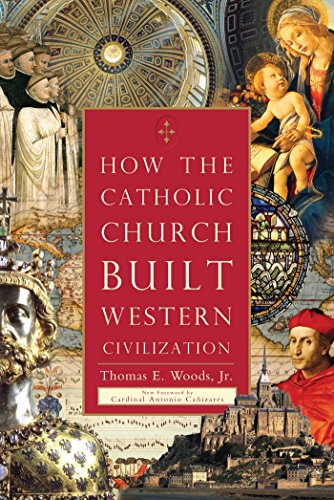Lately in Rome, the city where rumors are often reliable news, murmurs have been circulating that the Vatican may soon impose a more rigorous edict of suppression for the Traditional Latin Mass, and perhaps for other rites as well (e.g., the sacraments and divine office).
Should such an edict appear, it will once again raise two major questions of “practical theology” for universal debate, namely: (a) Does the Roman Pontiff have authority to prohibit the offering or attendance of the traditional Roman Rite? (b) If the pope were to declare such a prohibition (validly or not), would the faithful be obliged in conscience to comply, per the virtue of holy obedience?
In lieu of an extensive theological treatment, we might engage the simple wisdom of any First Communicant and “look it up in the catechism.”
 How the Catholic Churc...
Best Price: $8.00
Buy New $9.06
(as of 05:30 UTC - Details)
How the Catholic Churc...
Best Price: $8.00
Buy New $9.06
(as of 05:30 UTC - Details)
Testimony of Traditional Catechisms
After thousands of hours analyzing scores of catechisms from across the centuries,1 the current state of research behind the Tradivox project indicates that, whereas many catechisms have answered the second question (and/or the first only indirectly), only one official Catholic catechism has ever answered both questions directly.
Before exploring those answers, we should point out that over the past few generations, the virtue of obedience has been widely conflated with external compliance—especially with the directives of the higher clergy.2 Although the continuing scandal of clerical abuse and cover-ups has rightly shaken this simplistic conception, one needn’t look further than the great catechisms of yesteryear to find the notion of “obedience=compliance” flatly rejected.
Instead, perennial Catholic catechesis maintains that we must respectfully comply with the commands of all legitimate superiors in the family, state, and Church unless they are inducements to sin. While the explanations and examples of what qualifies as a sinful command provide a fascinating study in the catechetical tradition (something beyond the scope of this article), we may sum them up neatly: any order that undermines or contradicts right reason, natural or positive divine law, or the received doctrine, morals, and rites of the Church must not be obeyed.3
So striking are the assertions of some old catechisms on this score that today’s less-informed Catholic may find them a bit jarring.
Take the catechism of the world-renowned Jesuit St. Peter Canisius: familiar with hierarchs that harmed Catholic liturgy and undermined right doctrine, Canisius was sent to minister in the archdiocese of Cologne when it was still being governed by the heretical Archbishop Hermann von Wied. In his Large Catechism, written around that time, Canisius would write reprovingly of those who contemn the Church’s customary teaching or rites of worship,4 and when asking: “What conception ought we to have of evil priests?” he answers:
We do owe faith and obedience unto those only who, being lawfully ordained and sent by bishops, do profess the sound doctrine of the Church. But of others we must carefully beware, as of enemies and pestiferous persons.5
When compared to the overblown “blind obedience” mindset that later became common in the Church (due in part to Jesuit influence, ironically), this can sound more like a declaration of Protestantism or ecclesiastical anarchy than an articulation of Catholic faith and morals. Even so, it comes from a Doctor of the Church and the patron saint of catechists; and indeed, it was the standard fare of Catholic schoolrooms in former times.
The Catechism of the Council of Trent, that venerable grandaddy of conciliar catechisms (and still the most authoritative catechism in print), in its overview of the nature and limits of virtuous obedience, similarly affirms:
While it may seem strange, we are not excused from highly honoring [wicked pastors] even when they show themselves hostile and implacable toward us.… However, should their commands be wicked or unjust, they should not be obeyed, since in such a case they rule not according to their rightful authority, but according to injustice and perversity.6
Trent being highly indebted to the doctrine of St. Thomas Aquinas, we should also cite the Angelic Doctor’s own catechesis on this point—which, in a rather surprising comparison, equates obedience to unjust commands with a kind of idolatry:
 Timeless: A History of...
Best Price: $4.91
Buy New $16.33
(as of 09:46 UTC - Details)
Timeless: A History of...
Best Price: $4.91
Buy New $16.33
(as of 09:46 UTC - Details)
By their actions, [some] show that they believe in many gods…. In the same category are all those who obey temporal rulers more than God, in that which they ought not; such actually set these up as gods.7
Heirs of Aquinas, two eminent Dominicans would also write superb catechisms just a few years before the French Revolution. In them, the faulty commands of superiors—even popes—are held as decrees that must not be obeyed, yet without necessarily vitiating the authority of the superior.8
Framing such noncompliance as a positive moral duty would become increasingly common with the rise of secular states, and among the countless other examples that could be cited, we can end with the esteemed catechism of Fr. Joseph Deharbe. First appearing in German just before the turn of the 20th century,9 it reminded students the world over:
When are parents, superiors, and sovereigns not to be obeyed? When they command anything unlawful before God. ‘We ought to obey God rather than men’ (Acts 5:29). Examples: Joseph in the house of Potiphar; Susanna; the three young men at Babylon; the seven Machabees; the apostles before the council.10




